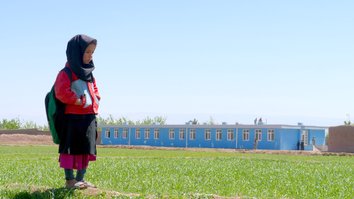PAKTIKA, Afghanistan -- Paktika Province authorities are encouraging families to enrol their children in schools.
The education campaign, launched March 20 by Provincial Governor Ilyas Wahdat, will continue through April 19 with the objective of informing citizens on the importance of education.
"I, along with other local authorities, civil society activists and tribal elders in Mata Khan District, am conducting a door-to-door campaign to explain the importance of science, knowledge, development and advancement to the locals, encouraging them to send their children -- boys and girls alike -- to schools," Wahdat told Salaam Times.
"We met a a great, positive public response," he said on the first day of the campaign. "The residents of this district showed great interest in learning, and they promised that they would definitely send their children to schools."
"Cultural and traditional restrictions prevented these families from allowing their daughters to go to schools," he said. "However, one can notice that a cultural revolution is under way."
The governor called on Afghanistan's international allies "to pay more attention and provide more help to the education sector" as a way to end the war, violence and extremism in the country.
Education brings a brighter future
Mohammad Nasim Wajid, chief of the Paktika education department, accompanied the governor for the launch of the campaign.
"We started this campaign by giving notebooks and pens to families and their children," he told Salaam Times. "We told them that, for their sons and daughters to have a bright future, they must be sent off to schools to gain knowledge."
"A few months ago, for the first time in the history of Afghanistan, 55 girls graduated from schools [in Urgun, Sharana and Khayr Kut districts]," he said. "And 30,000 female students attend schools in this province, which indicates the greatest change in people's thoughts and ideas."
"There are 350 working schools throughout Paktika Province, while work is under way to open 20 other schools," Wajid said.
Another 800 girls are set to enrol in literacy courses in public schools in five districts of Paktika, he said. "These efforts are funded by UNICEF, the Swedish Institute and the World Bank."
Tackling illiteracy
Illiteracy is one of the biggest challenges for Afghanistan, said Deputy Minister of Education for Literacy Sardar Mohammad Rahimi.
"Given that the majority of people of Afghanistan, especially residents of remote provinces, are illiterate, launching such campaigns to eradicate illiteracy and encouraging people to participate in the education process are a vital step for the country," he told Salaam Times.
"The ministry will support these campaigns, so that they can be launched all across the country," he pledged.
"Eradicating illiteracy and encouraging people to learn science and to gain knowledge are a duty of all governmental and nongovernmental institutions," he said.
"Illiteracy and lack of knowledge have caused our province to suffer from backwardness and lack of development," said Abdul Majid Khan, 40, a teacher and resident of Mata Khan District.
"Lack of knowledge is indeed the cause of extremism, wars, conflicts and all miseries from which we suffer," he told Salaam Times. "I promise that I will send my daughters and sons to school in order to save them from such calamity and misery."
"Moreover, I will be participating in this literacy campaign beginning today," he said.

![Paktika Governor Ilyas Wahdat March 20 leads a door-to-door education campaign in Mata Khan District to encourage residents to enrol their sons and daughters in school. [Sulaiman]](/cnmi_st/images/2017/03/30/7547-paktika_edit-585_329.jpg)





